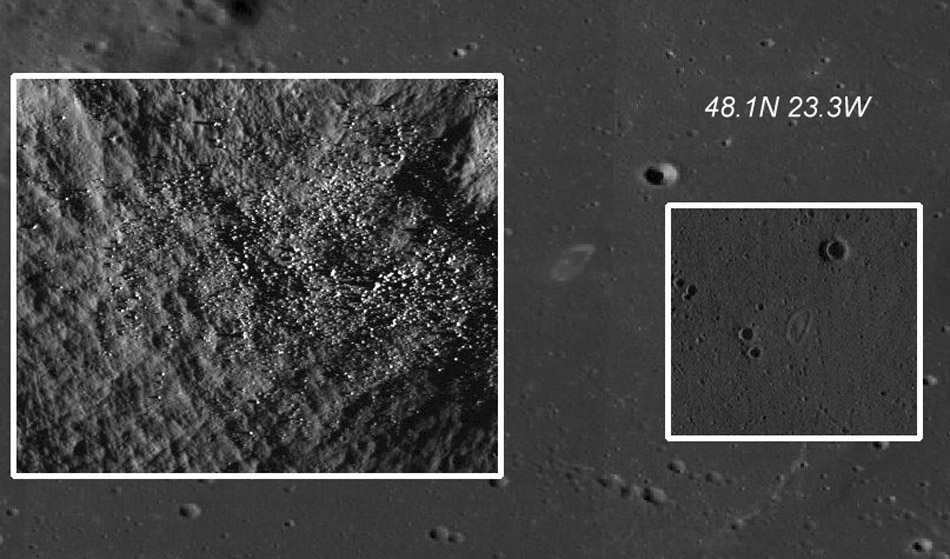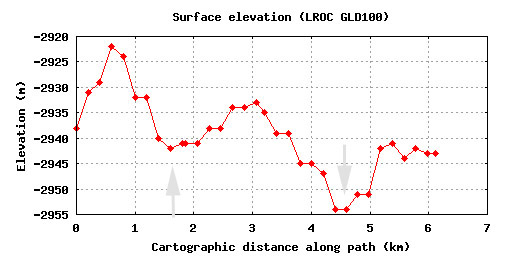Difference between revisions of "August 16, 2012"
| (One intermediate revision by the same user not shown) | |||
| Line 10: | Line 10: | ||
<td><!-- ws:start:WikiTextLocalImageRule:15:<img src="http://lpod.wikispaces.com/file/view/LPOD-Aug16b-12.jpg/358042831/LPOD-Aug16b-12.jpg" alt="" title="" /> -->[[File:LPOD-Aug16b-12.jpg|LPOD-Aug16b-12.jpg]]<!-- ws:end:WikiTextLocalImageRule:15 --><br /> | <td><!-- ws:start:WikiTextLocalImageRule:15:<img src="http://lpod.wikispaces.com/file/view/LPOD-Aug16b-12.jpg/358042831/LPOD-Aug16b-12.jpg" alt="" title="" /> -->[[File:LPOD-Aug16b-12.jpg|LPOD-Aug16b-12.jpg]]<!-- ws:end:WikiTextLocalImageRule:15 --><br /> | ||
</td> | </td> | ||
| − | <td>In the upper right corner of yesterday's [http://lpod. | + | <td>In the upper right corner of yesterday's [http://www2.lpod.org/wiki/August_15,_2012 LPOD] there is a small impact crater and just below it a tiny brighter oval. Maurice noticed that oval oddity and created the composite image of today's LPOD. The background image shows the feature on QuickMap and the smaller insert depicts it on the full resolution version of yesterday's mosaic. The oval looks like a boat wtih a hump rather than a mast. The oval is about 2.4 x 1.3 km in widths, and the QuickMap topo profile from left to right shows the rim (grey arrows) as not being raised - in fact, they look like local low spots. That is not consistent with the lower Sun inset picture that shows low elevated rims. According to QuickMap the mound is 5-20 m tall and fills more of the floor than it looks to on the lower Sun view. I don't know where the larger insert image comes from but presumably it shows a closeup of part of the floor. On the one LRO NAC image that covers the right edge of the feature there are many boulders visible, accounting for the lighter hue against the dark maria. This could be another of those Schiller type oblique impacts like [http://www2.lpod.org/wiki/June_25,_2012 Piazzi Smyth V], and its low to non-existent rim is similar, but this one has a hump instead of a ridge. For that reason it doesn't look so much like an impact feature. If it is volcanic - it is on the mare so that is quite possible - it is unlike other small volcanic features I remember. As we carefully examine more of the 100 m resolution WAC images we will presumably discover more boats and other unexpected objects, hopefully gaining more clues to their origins.<br /> |
</td> | </td> | ||
</tr> | </tr> | ||
| Line 21: | Line 21: | ||
WAC image insert (right) [http://wms.lroc.asu.edu/lroc/view_lroc/LRO-L-LROC-2-EDR-V1.0/M116479097ME M116479097ME]<br /> | WAC image insert (right) [http://wms.lroc.asu.edu/lroc/view_lroc/LRO-L-LROC-2-EDR-V1.0/M116479097ME M116479097ME]<br /> | ||
<strong>Related Links</strong><br /> | <strong>Related Links</strong><br /> | ||
| − | Rükl plate [https://the-moon.us/wiki/R%C3% | + | Rükl plate [https://the-moon.us/wiki/R%C3%BCkl_11 11]<br /> |
<br /> | <br /> | ||
<p><b>Yesterday's LPOD:</b> [[August 15, 2012|Inside the Rainbow]] </p> | <p><b>Yesterday's LPOD:</b> [[August 15, 2012|Inside the Rainbow]] </p> | ||
Latest revision as of 08:23, 28 October 2018
A Boat Upon the Sea

LRO composite compiled by Maurice Collins, New Zealand
 |
In the upper right corner of yesterday's LPOD there is a small impact crater and just below it a tiny brighter oval. Maurice noticed that oval oddity and created the composite image of today's LPOD. The background image shows the feature on QuickMap and the smaller insert depicts it on the full resolution version of yesterday's mosaic. The oval looks like a boat wtih a hump rather than a mast. The oval is about 2.4 x 1.3 km in widths, and the QuickMap topo profile from left to right shows the rim (grey arrows) as not being raised - in fact, they look like local low spots. That is not consistent with the lower Sun inset picture that shows low elevated rims. According to QuickMap the mound is 5-20 m tall and fills more of the floor than it looks to on the lower Sun view. I don't know where the larger insert image comes from but presumably it shows a closeup of part of the floor. On the one LRO NAC image that covers the right edge of the feature there are many boulders visible, accounting for the lighter hue against the dark maria. This could be another of those Schiller type oblique impacts like Piazzi Smyth V, and its low to non-existent rim is similar, but this one has a hump instead of a ridge. For that reason it doesn't look so much like an impact feature. If it is volcanic - it is on the mare so that is quite possible - it is unlike other small volcanic features I remember. As we carefully examine more of the 100 m resolution WAC images we will presumably discover more boats and other unexpected objects, hopefully gaining more clues to their origins. |
Chuck Wood
Technical Details
NAC image insert (left) M132982822R
WAC image insert (right) M116479097ME
Related Links
Rükl plate 11
Yesterday's LPOD: Inside the Rainbow
Tomorrow's LPOD: Yes, the Moon is Here
COMMENTS?
Register, Log in, and join in the comments.



